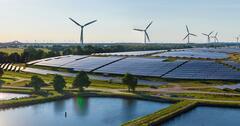

Most of America and Canada are at elevated risk of blackouts and power outages in the next five to 10 years, according to the North American Electricity Reliability Corporation's 10-year outlook report. The report, which was released last month, highlights the inadequacy of wind and solar to replace traditional energy generation like coal.
The 2024 Long-Term Reliability Assessment addresses the key problem for the grid: We plan to increase electricity demand while relying on energy sources that are woefully inadequate.
The key driver of increased demand is the progressive green push to electrify everything from home heating to transportation to various industrial processes. Plans to build data centers and create infrastructure needed for rollouts of artificial intelligence in numerous industries will also require far more electricity than is currently available. And there is also the natural tendency for the market to grow, requiring more energy to power more businesses and homes.
Meanwhile, there is not enough supply to meet growing demand because unreliable wind and solar can’t replace coal.
The NERC report explains that despite the attempt to replace coal with solar panels and battery backup, “the performance of these replacement resources is more variable and weather-dependent than the generators they are replacing. As a result, less overall capacity (dispatchable capacity in particular) is being added to the system than what was projected and needed to meet future demand.”
“Certain resource attributes – such as the ability to start up expediently, ramp output up or down quickly, and produce electricity at a high volume for long periods of time – are required to maintain reliability,” one major grid operator explained in testimony to Congress. “Those attributes have historically been provided by the traditional resources that are now being retired at an accelerating pace, and very few planned new generators possess them.”
Different forms of generation have different reliability qualities, and fossil fuels have key benefits that wind and solar can’t match.
“Thermal generation resources, such as coal-fired generators, have the capability to be dispatched when needed and provide system inertia, dynamic reactive support, and frequency response for stable grid operation. Most types of replacement resources have limited or none of these attributes,” NERC reports.
The problem is worse than that. According to projections by the major grid operator in the Midwest, the amount of dependable capacity in the grid in 2041 will be less than what we have now. This is a direct result of closing reliable and energy-dense coal plants.
The energy transition to wind and solar was decided before its practicality was tested. No place has found an increased reliance on wind turbines and solar panels to improve their situation. From California to Germany to the United Kingdom, the net zero energy transition has repeatedly raised prices while enriching solar and wind developers and allowing progressive policymakers to pretend they are solving a problem that didn’t really exist. It’s system collapse, with a facade of progress. Throwing away the power generators that have built and powered this country in favor of flashy, new, expensive, and less reliable downgrades is a grave mistake that will cost us heavily.
Permission to reprint this blog post in whole or in part is hereby granted, provided that the author (or authors) and the Mackinac Center for Public Policy are properly cited.
Get insightful commentary and the most reliable research on Michigan issues sent straight to your inbox.



The Mackinac Center for Public Policy is a nonprofit research and educational institute that advances the principles of free markets and limited government. Through our research and education programs, we challenge government overreach and advocate for a free-market approach to public policy that frees people to realize their potential and dreams.
Please consider contributing to our work to advance a freer and more prosperous state.

Donate | About | Blog | Pressroom | Publications | Careers | Site Map | Email Signup | Contact